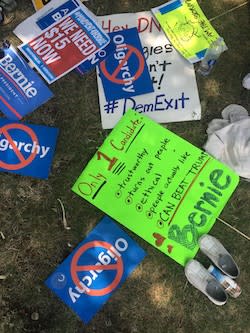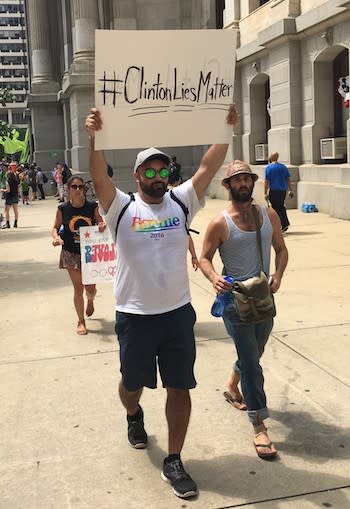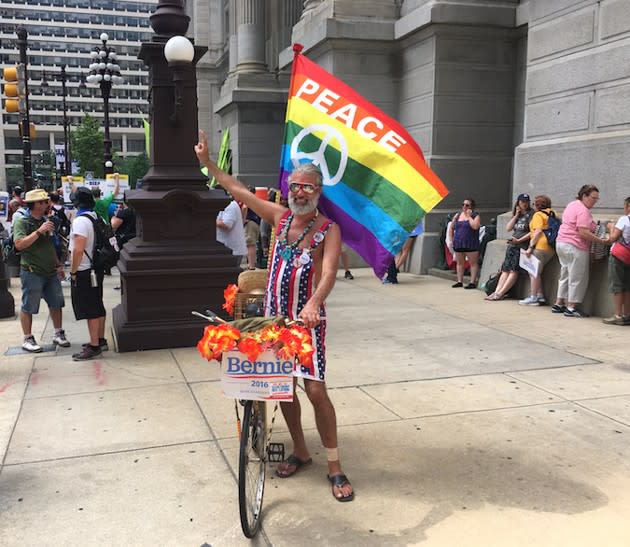The Streets of Philadelphia Are Anti-Hillary
PHILADELPHIA––On a sweat-soaked opening day of the Democratic National Convention, with temperatures pushing into the high 90s and strong thunderstorms in the forecast, the relatively powerful mostly spent their days indoors in air-conditioning: a breakfast meeting at the Marriott; a Bernie Sanders speech at the convention center (the hottest ticket in town for connected supporters of the Vermont senator); maybe even an Uber ride across town to the Wells Fargo Center, where Hillary Clinton supporters untroubled by any desire to dispute her imminent nomination stood on the arena floor around noon, holding cell phones aloft as Boyz II Men rehearsed an evening performance (“not too soft and not too strong”).
The grassroots opposition to Hillary Clinton, though, spent the day in the heat. They woke up sweating at the New Jersey campgrounds where many are making their home base. They sweated in the sunshine outside City Hall, beneath the statue of pacifist William Penn, where scores protested for passing cars and pedestrians, and others—Cornel West among them—milled around an interior plaza making connections.

Nearly everyone was sweat-soaked and dehydrated as hundreds completed a 2.6 mile march from City Hall down Broad Street to Marconi Square, with activists in wheelchairs leading the way and an army of Bernie Sanders supporters following. At their destination was another gathering of Bernie Sanders and Jill Stein supporters who’d spent their days listening to a series of impromptu speeches about a range of left-wing causes, but more than that, about the feeling among those gathered that Clinton did not deserve to be the Democratic Party’s nominee.

“I’m here for democracy,” said Susan, a 61-year-old accountant from Pittsburgh who was excited when President Obama was elected but enthralled when Bernie Sanders began his run. “Everything that Bernie said was what I'd been thinking all along,” she recalled. “I didn't think there was anyone else out there. I was just one old crazy lady.”
Recommended: Michelle Obama's Speech for the Ages
But there he was, criticizing GMOs and calling for a $15-an-hour minimum wage. He was, she thought, the man who would turn things around for her 10 children and 11 grandchildren. He would help them to inherit a country on the rise. She was thrilled on election day when she saw so many young voters at the polls. It just didn’t seem possible to her that Hillary Clinton won her precinct and her state. “All these first time voters that came out, that I talked to, that voted for Bernie, where were their votes?” she asked. “They never made it into the tally. And that happened in townships, small towns, suburban areas and cities all over the United States.”
There is no evidence for that proposition. Hillary Clinton’s wins at the ballot box were anticipated by the polling of multiple independent journalistic organizations.
(For the record, I, too, was hoping she would lose.)
But as Susan saw it, the election was always fixed, whether at the polls or through the machinations of DNC officials, as recently revealed in documents that were hacked, and then released by Wikileaks last week. So although she hadn’t participated in a political protest since the Vietnam War, Susan traveled to Philadelphia to stand up for democracy. “Our votes have been stolen from us, our rights have been taken away,” she said. “When 85 or 90 percent of the people want something and the hierarchy, the one percent, is telling us who we're going to have for a candidate, what our platform is going to be, and that we can't do anything about it, laughing at us, I'm pissed.”
Recommended: Trump Must Release His Tax Returns
Sitting in a shady spot, but still wilting in the afternoon heat, she said that her heart was warmed by the young people around her, and she intended to demonstrate and march beside them throughout the DNC as much as her health allowed.
One of those young people, Veronica, found her way to Marconi Square by way of a different issue. Although her classmates at the University of Massachusetts at Amherst, where she just graduated with a degree in chemical engineering, were most enthusiastic about protests for social justice, she felt that social justice issues were more of a symptom of larger evils rooted in economics. “For me, multinational corporations are the biggest evil,” she said. “You can't fix anything until you fix that.” That belief has caused her to oppose the TransPacific Partnership, which she describes as NAFTA 2.0, “and we all know that NAFTA didn’t work.”
Her shirt showed her allegiance: Jill Stein, the Green Party nominee.

She traces her political awakening to an early job search, when she researched the companies that hire the most chemical-engineering graduates and discovered, to her horror, that she regarded business practices at most or all of them as abhorrent.
“I want to see not trickle-down economics but ground up,” she said. “I work on a produce farm, and we do CSAs, we have farmers’ markets, so that kind of economy, build it from the ground up. There is a place for big companies. Some things it makes sense to do on that scale. But they shouldn't be super powerful. They shouldn't have the power to sue our government. And you should have a choice. I have a chart that's posted in my room—it’s 10 companies that own every other company.”

Will the folks who marched down Broad Street and gathered in Marconi Square vote for Hillary Clinton once the convention is over and it’s clear, even to them, that Bernie won’t be president, whereas Donald Trump may well be? Many of the people with whom I spoke didn’t want to engage the question. Clinton hadn’t yet formally received the nomination. They insisted, in effect, that it wasn’t over until it was over.
Nationwide, polls suggest that the vast majority of Bernie Sanders voters will back the Democratic nominee––roughly 90 percent of them, if the Washington Post’s analysis is correct.

But it’s a special subset of Bernie supporters who’ve taken to the streets in Philadelphia. They’re so bothered by the course of events that they overcame the inertia of staying home, the cost and inconvenience of traveling to a city filled to the brim with people, and the heat that makes a mere 10-minute walk outside miserable. Here, the civic-minded folks who are willing to address the question, in interviews, signs, or shouted chants, insist that they just can’t pull the lever for Clinton. “If you cheat it’s not a win,” dozens chanted on the march down Broad Street. “Now we have to vote again!” A speaker at Marconi Square told the crowd that while Donald Trump was a McCarthyite, Clinton’s foreign policy was approaching Holocaust levels of awfulness in lives lost. “I say if Bernie does not get the nomination, we unite,” the speaker concluded, “United We Stein, Divided We Fall.”
Kathleen, a middle-aged woman from Santa Rosa, California, explained, “We feel that there's a lot of corruption, and we're all for Bernie. We're just here to support the community. People ask if we’ll vote for her if it comes to that. But we don't agree with her politics. We'd like to have a third party, so this is a beginning for that.”
Recommended: Can Bernie-or-Busters be Shamed into Submission?
Said one sign, “Jill, Never Hill.”
Said another, “Bern the system down!”

For Democratic delegates who still support Sanders, traveling to Philadelphia was less of a sacrifice even as it offered a greater opportunity to make their voices heard within the process. And Monday night, as Boyz II Men performed for real at Wells Fargo Center and the official proceedings kicked off, there were many moments early in the evening when some in the arena took to chanting Bernie or booing when they felt that his agenda was being disrespected or Clinton’s rise was being praised.
At 7 p.m. on Monday, as I write this, the room sounds divided about Clinton, even as it is united around the proposition that Donald Trump, the Republican nominee, is a vile bully.
For Clinton supporters, the inconvenient truth is that their nominee, and the DNC machinations that sought to guarantee her ascendance, are unsavory in ways that will not be easily forgotten, no matter how bad the GOP nominee may be.

For Clinton opponents, whether they support Sanders or Stein or no one at all, the inconvenient truth is that they cannot both champion democracy and oppose Clinton, because for all her flaws, she did not ultimately steal the election from her rival. Unfairness at the DNC did not determine the outcome. In the end, Clinton won the most votes, she did not need superdelegates to put her over the top, and she was, therefore, the choice of the people, or at least the subset who vote Democratic. Just as awarding the nomination to Ted Cruz rather than Donald Trump would’ve overturned the will of GOP voters, whether for better or worse, denying Clinton the nomination would overturn the democratic will of Democratic voters, including a majority of black, Hispanic, and non-college-educated voters, and a majority of voters with incomes below $55,000 in states where that was tracked.
It may be that the future belongs to Sanders, or a successor who takes up his agenda—he was at his strongest with young people—but if there are many good reasons to object to Clinton, the notion that Sanders is the rightful democratic winner isn’t one of them. To march in Philly for Sanders is to declare that the people got it wrong.
Read more from The Atlantic:
This article was originally published on The Atlantic.
